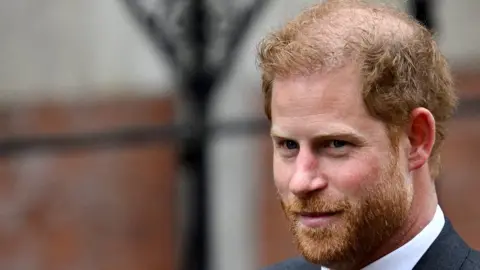Top Mirror group lawyer 'didn't know' about phone hacking
 Reuters
ReutersThe most senior lawyer at the Daily Mirror's publisher has denied being told the sources of stories allegedly obtained via phone hacking and other methods, the High Court has heard.
Paul Vickers was group legal director at Mirror Group Newspapers until late 2014.
He was giving evidence to the civil trial into breaches of privacy of the Duke of Sussex and other figures.
MGN denies senior executives knew about the practices and failed to stop them.
The newspaper group published the Daily Mirror, Sunday Mirror, and Sunday People titles.
Paul Vickers was giving evidence on day 12 of the trial, and detailed what he knew about stories where it is alleged MGN journalists acted unlawfully.
Asked if he was told by a colleague the paper would have to settle a claim brought by the footballer Garry Flitcroft because it could not disclose the story was based on information that had come from phone hacking, he responded: "No, absolutely not."
The court heard Mr Vickers describe a "no surprises rule" he had with fellow in-house lawyers at MGN, which was designed to ensure any problematic issues or claims were brought to his attention.
In written testimony, he said he was not aware of a story published by the Daily Mirror about details garnered from footballer Rio Ferdinand's mobile phone, nor the sources for the story.
He denied knowing about phone hacking from as early as 1999 through until 2007, and said he only became aware of it after claims were made by alleged victims against MGN in 2012.
He said he "visited the newsroom floor very rarely" as part of his role and was "sometimes referred to as the angel of death", due to his involvement in the firing of a journalist and the latter expulsion of the then editor Piers Morgan.
'Unlawful' techniques
In repeated exchanges with David Sherborne KC, acting for the claimants, Paul Vickers refused to accept some techniques used by MGN journalists had been "unlawful".
Asked about the "blagging" of information by a private investigator working for the paper, he said "it was certainly a civil breach".
Mr Sherborne asked: "Do you have a problem accepting the word unlawful?"
"It's too broad a term," he responded.
Asked if he thought obtaining ex-directory phone numbers or car registration details was unlawful, Mr Vickers said "it depends on how it was being done".
Mr Vickers was then asked about James Hipwell, a former Mirror journalist who had raised concerns about phone hacking at MGN.
He said his "judgement had been clouded" in relation to Mr Hipwell, who was dismissed from the paper in 2000, before coming forward with detailed allegations of widespread phone hacking.
Mr Vickers said he believed Mr Hipwell was "devious" and "slippery".
The court heard details about MGN's use of private investigator Jonathan Rhys, and how much information about payments being made to him was disclosed to police.
Asked by Mr Sherborne about MGN's disclosure of information to the police about the use of Mr Rhys and his various companies after the arrest of one of its journalists, Mr Vickers said: "I agree that the company (MGN) is not telling the police about the payments".
The court heard payments to Mr Rhys' companies continued while lawyers for MGN told police payments to another named company - also used by Mr Rhys - had stopped.
It was repeatedly put to him that MGN's behaviour towards the police had been "completely disingenuous... and misleading".
Asked about a Daily Mirror story, which revealed the bank debts of Prince Michael of Kent and a subsequent settlement by MGN regarding a breach of privacy, Mr Vickers told the court: "I can't recall being aware or involved."
The court heard private financial details had been obtained by investigators unlawfully blagging information during various phone calls with private bank Coutts or other entities, in which they lied about who they were.
Mr Sherborne asked Mr Vickers if he "would want to know why" the paper was settling, he responded "only in the broadest sense".
He told the court that this period - in early 1999 - was a "crazy time" as the then chief executive had been forced out. He said his focus on editorial aspects of the paper then had been "absolutely minimal".
Asked why he agreed to settle the case and the knowledge he had of the unlawful practices used, Mr Vickers said: "No... I can't remember. I imagine I was told 'we had to get out of this one [Prince Michael of Kent claim], do you agree?' and I'd have said yes."
The trial continues.
